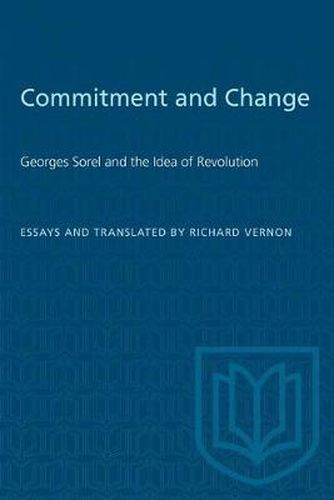Readings Newsletter
Become a Readings Member to make your shopping experience even easier.
Sign in or sign up for free!
You’re not far away from qualifying for FREE standard shipping within Australia
You’ve qualified for FREE standard shipping within Australia
The cart is loading…






This analysis of Georges Sorel’s ideas on revolution and the original translations of some of his little-known writings on this theme offer a critical reassessment of Sorel’s place in modern political thought.
By turns conservative pessimist, social democrat, revolutionary syndicalist, and reactionary, Sorel is a perplexing figure. He has long been regarded as one of a generation of intellectuals who abandoned reason for violence, theoretical reflection for practical commitment. But according to Sorel – as the title of his most notorious book makes clear – the task of the theoretician is to reflect on violence. He maintained that reflection discloses the limited and deficient character of practical thought, but he also recognized that the springs of action escape the grasp of the reflective theorist. It was this distinctness of theory and practice that Soreal attempted to come to terms with in his thinking on revolution. If revolution is a violent action, it is also a process of structural change which the actors themselves do not comprehend. This theme enables the reader to grasp a significant degree of continuity among some of Sorel’s bewilderingly diverse positions. Moreover, it accounts for much of his critique of Marxism and his sceptical reflects on Marxian notions of history, class, consciousness, and party.
Placed in the context of modern revolutionary thinking, Sorel is an eccentric figure but not an irrelevant one, for his approach points to some of the difficulties in the idea of revolution that were largely overlooked by the ‘New Left.
$9.00 standard shipping within Australia
FREE standard shipping within Australia for orders over $100.00
Express & International shipping calculated at checkout
This analysis of Georges Sorel’s ideas on revolution and the original translations of some of his little-known writings on this theme offer a critical reassessment of Sorel’s place in modern political thought.
By turns conservative pessimist, social democrat, revolutionary syndicalist, and reactionary, Sorel is a perplexing figure. He has long been regarded as one of a generation of intellectuals who abandoned reason for violence, theoretical reflection for practical commitment. But according to Sorel – as the title of his most notorious book makes clear – the task of the theoretician is to reflect on violence. He maintained that reflection discloses the limited and deficient character of practical thought, but he also recognized that the springs of action escape the grasp of the reflective theorist. It was this distinctness of theory and practice that Soreal attempted to come to terms with in his thinking on revolution. If revolution is a violent action, it is also a process of structural change which the actors themselves do not comprehend. This theme enables the reader to grasp a significant degree of continuity among some of Sorel’s bewilderingly diverse positions. Moreover, it accounts for much of his critique of Marxism and his sceptical reflects on Marxian notions of history, class, consciousness, and party.
Placed in the context of modern revolutionary thinking, Sorel is an eccentric figure but not an irrelevant one, for his approach points to some of the difficulties in the idea of revolution that were largely overlooked by the ‘New Left.